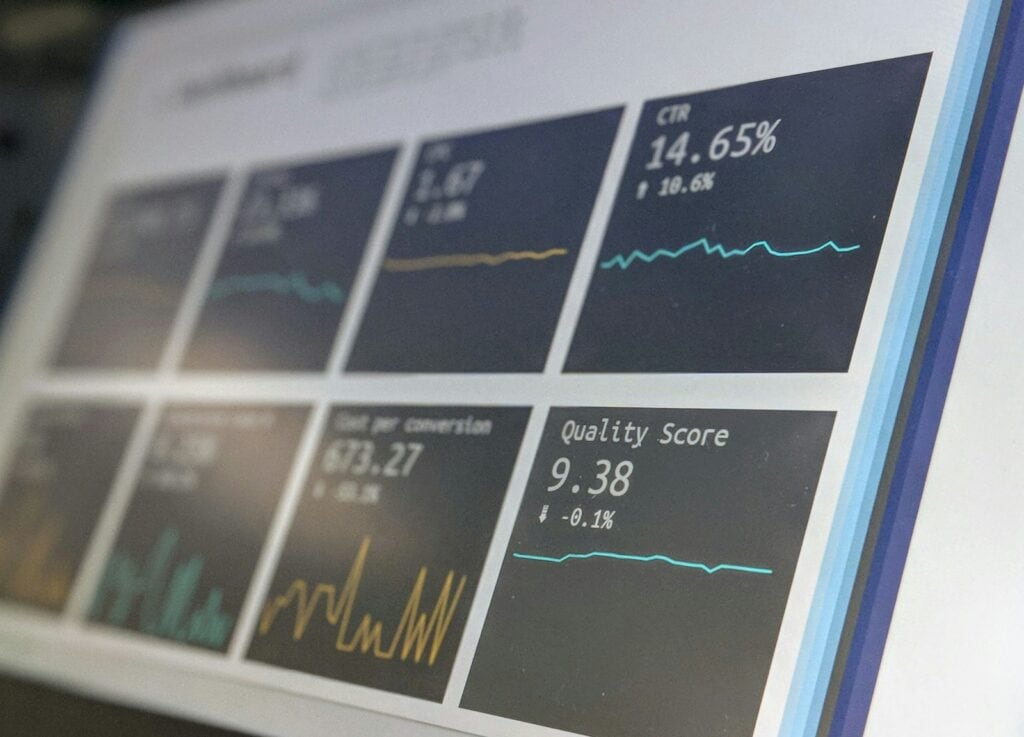Debt service coverage ratio (DSCR) loans are investment property loans that allow borrowers to qualify for a loan on a profitable income property based on its cash flow—not the investor’s personal income.
Why Georgia is a great place to invest in real estate
Georgia is attracting investors thanks to housing costs below the U.S. average, affordable living, a strong economy, low taxes, and some of the friendliest people you’ll ever meet.
The median home price in Georgia jumped in July by more than 16%, increasing from $300,000 to $349,900, while the number of days on the market dropped 4.3 percent.
Because of its southeastern location, Georgia offers a temperate climate allowing visitors and residents to experience all four seasons while enjoying professional and recreational sports teams, world-class entertainment, and global cuisine.
Bordered by the Atlantic Ocean, Florida, Alabama, Tennessee, North Carolina, and South Carolina, the Peach State is a regional hub always bustling with activity.
Atlanta’s population is booming, adding roughly 65,000 new residents this year, slightly surpassing last year’s gains. With a population of 5.1 million, Atlanta offers the largest real estate market in the state. While other major cities, such as Savannah, Augusta, and Macon, may have smaller markets, they are no less competitive.
DSCR loans in Georgia offer a streamlined application process and a no-income verification to get the financing you need to build your portfolio quickly.
How do DSCR loans in Georgia work?
Lenders evaluate an investment property’s income to determine whether it qualifies for a DSCR loan.
If your investment property has enough income to cover the monthly payment, borrowers usually don’t have to provide income verification.
Let’s look at an example.
Let’s say you have a property with a monthly income of $3,000, and the estimated monthly payment for the property is $2,000. In this scenario, because this property has a significant DSCR ratio, it’s unlikely that the lender will ask for income documentation or tax returns.
Not having to provide income documentation can make or break an opportunity for investors and self-employed professionals with elaborate tax returns or tax returns that don’t demonstrate your actual income, i.e., many deductions.
New investors, who may have a low-to-average W2 income or high debt-to-income ratio, can also benefit from DSCR loans.
Check your DSCR loan eligibility.How is DSCR calculated?
A debt service credit ratio (DSCR) is always written as a decimal, i.e., 1.5 or 1.5x. Lenders rely on the DSCR to assess whether an investment property can generate adequate cash flow to cover the monthly payments.
- A DSCR ratio of 1.0 means the property will break even
- A DSCR ratio of 1.25 means the property has 25% more income than necessary for its monthly mortgage payments
While most lenders in Georgia look for a minimum DSCR of 1.25, some will consider lower DSCR ratios.
DSCR = Income / Payment
Determining DSCR Income
Residential investment properties: To calculate DSCR, lenders divide the investment property’s monthly rental income by the predicted monthly mortgage payment.
Commercial properties: Lenders look at an investment property’s net operating income (NOI) versus mortgage payments. NOI is the property’s gross income less any business expenses, i.e., utilities or management fees.
For DSCR purposes, mortgage lenders use a combination of an investment property’s mortgage principal and interest plus taxes, insurance, and association fees (HOA) to calculate the total monthly payment.
Example: How lower payment can improve DSCR
| Income | Payment | DSCR |
| $1,750 | $1,500 | 1.16 |
| $2,000 | $1,500 | 1.33 |
Example: How lower payment can improve DSCR
| Income | Payment | DSCR |
| $1,500 | $1,250 | 1.2 |
| $1,500 | $1,000 | 1.5 |
Pro Tip: The higher your DSCR, the better your chances of being approved for a DSCR loan in Georgia. When evaluating investment properties, consider ways to increase your property’s income and/ or reduce your monthly payment amount.
What is the minimum DSCR to qualify in Georgia?
Each mortgage lender sets its minimum DSCR. In general, however, most lenders in Georgia require a minimum DSCR of 1.25—this also helps you reduce the risk of losing money each month. In addition, some lenders will work a minimum DSCR of 0.75, while others have no minimum requirement.
Pro Tip: The higher the DSCR, the better your mortgage rate.
How to qualify for DSCR loans in Georgia
While DSCR requirements can differ by lender, most Georgia lenders follow these general guidelines.
Loan-to-value (LTV): For new mortgages, borrowers must have a down payment of between 20 and 25% of the property’s sale price, meaning a loan-to-value (LTV) ratio of between 75-80%. For refinancing, borrowers must have a minimum of 20% equity in the investment property after closing.
Credit score: Generally speaking, most DSCR lenders in Georgia are looking for a minimum 640 credit score. However, acceptable credit scores for a DSCR loan can range from 620 to 680.
Loan purpose: Borrowers can use a DSCR loan for either a new mortgage for an investment property or to refinance an existing mortgage—standard or cash-out.
Property types allowed: Borrowers commonly use DSCR loans to purchase single- and multi-family residences in Georgia. These can be condos, condotels, townhomes, etc., of up to four units. Select lenders in Georgia allow non-warrantable condos, commercial apartment buildings (5+ units), and more.
Property use: Borrowers can only use DSCR loans to purchase investment properties. These can be long- or short-term rentals like VRBO, Airbnb, or independent short-term rental contracts. Primary residences are not eligible for DSCR loans.
Loan Type: Popular DSCR loan types include 40-year interest-only, 30-year fixed and adjustable loans.
Income and employment, debt-to-income ratio: DSCR loans do not have a maximum debt-to-income (DTI) since they don’t require income verification.
Maximum loan amount: Lenders set the maximum loan amounts for DSCR loans. Although some lenders offer loans for as much as $5 million, DSCR lenders more often set loan limits of $1-2 million.
Maximum properties owned: There’s no limitation to how many properties a borrower can own while still qualifying for a DSCR loan.
Prepayment penalties: Prepayment penalties are common with many DSCR loans. Before applying for financing, discuss possible penalty amounts for early payment or refinancing.
Closing in the name of an LLC: DSCR loans allow borrowers to close in the name of an LLC.
Seller-paid closing costs: Most lenders allow a seller to pay a portion of closing costs. Check with your DSCR lender to see if they permit seller-paid closing costs.
DSCR mortgage rates in Georgia: Because mortgage lenders assume a more significant risk with DSCR loans, DSCR mortgage rates can be higher than conventional Fannie Mae or Freddie Mac loans. However, many investors view the 1-2% mortgage rate increase as a minor concession for not having to verify their income.
See if you qualify for a DSCR loan.5 best areas to invest in Georgia
Despite a 25% increase in home values, Georgia’s median price of $319,431 is still well below the national average.
Atlanta Metropolitan Area
In the greater Atlanta area, home prices have already jumped 28.6% just since last year, and Realtor.com forecasts that housing prices will continue to grow over the next 12 months. Currently, renter-occupied households make up 55% of residents.
Savannah
As Georgia’s oldest and arguably most eccentric city, Savannah offers history, culture, beaches, fine dining, some of the best blues you’ll ever hear, and much more.
Home prices have risen steadily in Savannah since 2015, with the average home price now sitting at $278,598, up from $220,000 in August of last year.
Savannah rents are higher on average than many other cities, with three-bedroom apartments averaging $1,855 per month.
In addition to Savannah’s ten private and public universities, the city is frequently home to film and television productions, including Midnight in the Garden of Good and Evil and AMC’s hit series, The Walking Dead.
Augusta
The current median home price for Augusta is $172,243, significantly below the national average, opening the state up to investors with limited capital.
Rents in Augusta are also less than major centers like Atlanta or Savannah, averaging $1,249 for a three-bedroom unit. In addition, the Masters Tournament takes place in Augusta each year, bringing more than 50,000 visitors to the city.
Macon
For investors looking for lower-priced investments, homes in Macon might be for you. The average home in Macon costs $141,522— but that’s still a more than 50% leap from $74,426 in 2015. The monthly rent for a three-bedroom brings in $1,058—the lower initial investment combined with consistent rents position Macon to provide a high DSCR for investors.
Columbus
Bordering the beautiful Chattahoochee River, the median home price in Columbus has risen more than 35% since 2015. Investors can buy a home in Columbus for $150,437. Three-bedroom apartments rent for $1,109 per month, an 8% increase over last year and are expected to continue to rise.
5 tips for real estate investors in Georgia
What should you know about investing in Georgia real estate?
Identify what you want
Knowing what type of property you want will help you recognize the right choice when you find it. For example, first-time investors with no property management experience might find a single-family residence more manageable than an apartment building.
Expect vacancies
Planning for a vacancy can limit the negative impact of having an empty rental on the books. A good guideline to help mitigate loss due to vacancies is to budget for between 2 and 3% less revenue per year.
Know your budget
To ensure you don’t overextend your finances, it’s necessary to define them. Knowing what you can safely afford will help you find the best investment for your budget.
Location
Location is essential, especially when considering residential properties. Up-and-coming neighborhoods can offer an excellent initial investment and the potential for a good return. Whereas areas close to schools often appeal to young families who plan to stay put for a number of years.
Learn the local market
Partner with a local Georgia real estate agent who specializes in working with investors. They’ll not only help you navigate Georgia state laws, but you’ll benefit from their in-depth knowledge.
FAQ
Because DSCR loans don’t require borrowers to provide financial or tax information, they are usually processed faster than traditional loans.
Eligible investors in Georgia can have multiple loans for eligible properties simultaneously.
Lenders don’t need a borrower’s income tax, pay stubs, or other personal income documentation. Instead, they use a residential property’s principal, interest, taxes, insurance, and fees (if applicable) to calculate the debt service credit ratio.
DSCR loans generally have 30-year terms, but 40-year options are available. Common loan types include interest-only, fixed and adjustable rates.
If you’re considering an investment property in Georgia, a DSCR loan could be the right financing tool to help you quickly grow your portfolio.
Get started building your real estate portfolio
It’s a fantastic time to build your portfolio, and few better programs than a DSCR loan to do it.
Get your next deal reviewed and see if this loan will work for you.
Submit your DSCR loan scenario.




